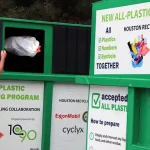Xcel Energy’s headquarters building at 1800 Larimer Street. April 28, 2022.
Kevin J. Beaty/Denverite
The Denver City Council threw a curveball at Mayor Mike Johnston’s administration and the state’s most powerful utility on Monday night.
Xcel Energy is seeking an extension of the franchise agreement that allows it to operate in Denver. The agreement, up for renewal after 20 years, requires the approval of Denver voters.
But on Monday, the city council voted against placing the measure on the November election ballot. Council members raised a variety of concerns about Xcel’s service in the city, and said they wanted to take more time to talk with community members and negotiate the agreement.
Council had complaints, from a Coca-Cola bottling plant to a lack of data sharing
Councilmember Stacie Gilmore argued that Xcel had done a poor job of working with Swire Coca-Cola, which aimed to open a bottling plant near the airport, but may cancel the project due to delays in planning for power provision.
“It clearly shows the lack of coordination regarding the Coca-Cola project, and the subsequent loss of the development that meant high-paying jobs for my residents,” Gilmore said. “The process is broken and needs to be forced back to negotiate better long-term planning for the next 20 years.”
She called it a “once-in-20-years opportunity” for the council to express its vision for the city’s energy grid.
Councilmember Shontel Lewis said the city should ask for more benefits, such as data sharing, from Xcel.
“There is no obligation, as currently drafted for Xcel, to share data, no obligation to improve customer service, no metrics by which we could measure their performance,” she said.
Councilmember Sarah Parady similarly said the city should push for access to more detailed data about energy usage and generation.
Councilmember Chris Hinds said that the council was only brought in “at the end of the process,” some 16 months after negotiations between the city administration and Xcel began. His district’s complaints include trash and graffiti at power substations around Capitol Hill.
He pointed out that even if the franchise agreement doesn’t appear on this November’s ballot, there are still elections next June and November before the current agreement expires.
But other council members said it wasn’t the time to take on individual grievances.
Councilmember Jamie Torres said that her district has its own issues with Xcel — they really want the utility to help with the redevelopment of its historic Zuni power plant. But she said securing the franchise agreement would ensure that Xcel continues to cover major costs for utility relocations related to construction projects, which have totaled billions of dollars during the current franchise agreement’s term.
“I have to compartmentalize away some of the work that’s happening in my district, no matter if this passes or fails, and really focus in on what is this agreement asking us to send to the voters, and what do they think?” she said.
Councilmember Darrell Watson said he was also disappointed by the potential cancellation of the Coca-Cola plant, but expressed his faith in the overall proposal.
“That being said, we are negotiating a franchise agreement that I believe is solid,” he said.
Xcel said it was ‘disappointed’
Robert Kenney, president of Xcel Energy, spoke before the council.
“We have every confidence in our ability to serve the Denver City, the Denver Airport, with clean, reliable, safe energy,” Kenney said.
Separately, Xcel defended its handling of the Coca-Cola plant. In a letter read into the record by Gilmore, the company said that it had invested substantially in planning for the project’s power, despite a lack of signed agreements or funding from Swire.
“This level of financial risk is atypical for us. In other words, we deviated from our normal procedures to keep this project on track,” the letter stated.
The community organization Together Colorado had rallied opposition to the agreement as drafted, with leader Jeffrey Ackermann raising concerns about rising utility rates and a lack of support for people whose homes (and wallets) are ill-equipped for the extreme heat of climate change.
“Our immediate focus is on an improved process that can yield durable solutions. The proposed franchise agreement lacks any customer-focused solutions, not even a commitment to pursuing solutions,” he wrote.
In a statement, Xcel said it was “disappointed Denver City Council denied Denver voters the ability to vote on the franchise agreement” in November.
“We will continue to serve our Denver customers with the clean, safe, reliable and affordable energy they rely on as we determine next steps and bring it back for consideration in 2026 in conjunction with the expiring of the current agreement,” wrote spokesperson Michelle Aguayo.
If a franchise agreement isn’t reached, Xcel could continue to provide service, as it did in Boulder during that city’s failed effort to create a municipal power utility. But operating without a franchise agreement also could mean that the utility doesn’t provide benefits like funding for power infrastructure projects.











